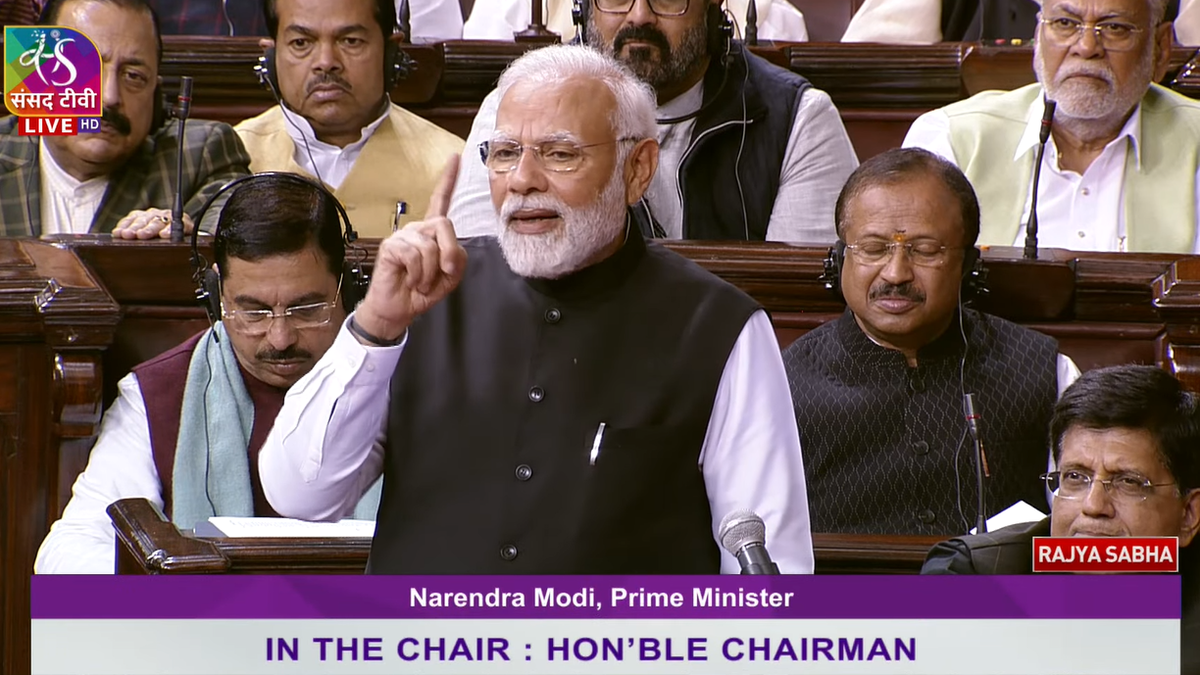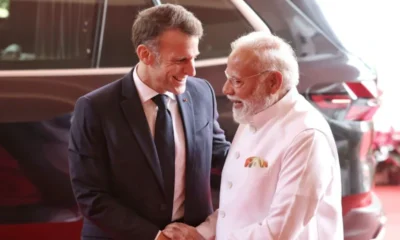Prime Minister Narendra Modi on Thursday launched yet another scathing attack on the Congress saying that the BJP practices “true secularism” which ensures that common man becomes the primary beneficiary of the central government’s schemes.
Speaking in reply to Motion of Thanks on President Droupadi Murmu’s address in Rajya Sabha, PM Modi in a clear dig at the opposition, asserted that the lotus (BJP’s symbol) will bloom “no matter how much you sling at us.”
‘True secularism’
The Prime Minister said that true secularism is making sure that benefits of various government schemes reach all eligible beneficiaries, not just your people from your vote bank. He said that his government’s priority has always been to empower the public unlike the previous UPA regime that only saw political opportunity.
This is why, he said, LPG connections were provided to 25 crore families across the country.
PM Modi in his tirade against the grand-old party claimed that the Congress merely raised empty slogans like ‘Gareebi Hatao’ (remove poverty), but never actually did anything about it for over four decades while the BJP-regime works hard to meet the expectations and aspirations of the people.
The Prime Minister continued his assault on the decade-long Congress-led rule, comparing the UPA regime’s performance with that of his own government.
He claimed that the Congress always created hurdles in development resulting in India “losing” six decades while smaller countries progressed, adding that Congress only engaged in ‘tokenism’ and never tried to find permanent solutions to problems confronting country.
The BJP government, he said, is always moving ahead with permanent solutions, adding that the Congress “continues with its conspiracies” despite being rejected by voters.
Read Also: Uttar Pradesh: Drunk driver rams car on two passersby in night, horrific incident goes viral | WATCH
‘Lotus will bloom’
Amid deafening slogans of ‘probe Adani’ and ‘Modi-Adani bhai bhai’ (Modi and Adani are brothers in arms), the Prime Minister, undeterred, remarked that the conduct and tone of some members is disappointing for the whole nation, adding that such people will realize that “Jitna keechad uchhaloge, kamal utna hi khilega (the more mud is thrown at us, the more the lotus will bloom)” and they (opposition) will have an equal role in the blooming of the lotus.
“…we will thank them (opposition),” PM Modi said sarcastically.
In another slide at the opposition, the Prime Minister quoted a couplet in Hindi: “Keechad uske pas hai, mere pas gulal. Jo bhi jiske pas tha usne diya uchaal (all they have is mud, but I have gulal. Each threw whatever they have in their hands)
PM Modi then aimed his attack at Leader of Opposition in the Rajya Sabha Mallikarjun Kharge, who in his speech in the Upper House earlier, had targeted the Prime Minister and his BJP government over the Adani controversy.
The Prime Minister said the Congress chief complains that he (Modi) visits Karnataka’s Kalaburagi but chooses to overlook the work that has been done there, adding that 1.70 crore Jan Dhan bank accounts have been opened in Karnataka, including over 8 lakh accounts in Kalaburagi.
The PM jibed: “so many people getting empowered, while someone’s account getting closed, I can understand the pain.”
During the speech, opposition members relentlessly raised loud slogans demanding a Joint Parliamentary Committee investigation into allegations against the Adani Group.
Wayanad MP Rahul Gandhi and Congress chief Mallikarjun Kharge questioned why parts of their speech on PM Modi and Gautam Adani, in Lok Sabha and Rajya Sabha respectively, were expunged.
On Tuesday, Rahul Gandhi, while participating in a debate on the Motion of Thanks to the President’s Address in Lok Sabha, claimed that Adani Group Chairman Gautam Adani’s fortunes skyrocketed after the BJP came to power in 2014 and he rose from the 609th to the second spot in the global rich list.
Gandhi’s remarks drew a sharp response from Treasury benches, with Law Minister Kiren Rijiju asking him not to level “wild allegations” and to furnish proof of his claims.
BJP leader Ravi Shankar Prasad had accused Rahul Gandhi of making baseless, shameless and reckless allegations and charged that the Congress and the Gandhi family were involved in “big scams” that “tarnished” the country’s image.
Speaking in the Lok Sabha on Tuesday, Rahul Gandhi said that people are inquisitive to know about the relationship shared between the business typhoon and the Prime Minister of India. Gandhi in his address also alleged that rules were neglected or altered in order to benefit Adani and his business.
The Wayanad MP also said that across the states be it Tamil Nadu, Kerala, to Himachal Pradesh, he has been hearing only Adani’s name throughout the country. Gandhi further said that someone asked him that despite entering whichever field, Adani’s business never fails.
Maharashtra journalist killed for exposing alleged criminal, accused arrested
Kuwaiti woman goes missing from Kolkata, found in Bangladesh: Police


 India News23 hours ago
India News23 hours ago
 Latest world news23 hours ago
Latest world news23 hours ago
 Latest world news8 hours ago
Latest world news8 hours ago
 Latest world news8 hours ago
Latest world news8 hours ago
 India News8 hours ago
India News8 hours ago
 Latest world news8 hours ago
Latest world news8 hours ago
 India News8 hours ago
India News8 hours ago











